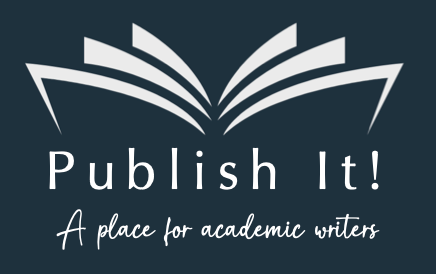Your research is worth publishing: Tips on how to engage the scientific discourse in your journal paper by subordinating and surfacing your big idea
Jul 03, 2025
Writing is a collaboration
Writing a journal paper is about participating in a conversation with every researcher before, during and after you. Be clear on how your argument relates to previous arguments. Spend time articulating your core argument or big idea as it relates directly to the most important current research and conversations.
The easiest way to write a paper worth publishing is
to avoid irrelevant information and focus on the real issue.
One thing I commonly see when I review papers is a tendency to either oversimplify or exaggerate the counter argument. This is the fallacy of the straw man, also known as a ‘red herring.’ I urge you to be mindful of this risk when you summarize the scholarly discourse and craft the conversation or debate that you want your argument to respond to. Creating an argument that misrepresents the real issue or debate is often an attempt to bias the opposition (and reader) toward a weaker point of view that is easier for you to ‘win.’
Why does this happen? Why might you be at risk of doing this? It could be that you haven’t authentically and critically considered the broader contextual issues. Or it could be that you are not confident your research is good enough to stand up to the established status quo. In the first case, more literature review is needed. You and your audience will benefit so do it! In the second case, I encourage you to dig deeper and find the reason your paper is worth publishing. So let’s talk about the reasons your paper is worthy.
Are your data worthy?
Before I get into how to dig deeper, I want to point out a very important shortcoming that cannot be overcome. That is: if your methods are not sound, nothing else matters. I don't say this lightly, but I also don't say this to discourage you. I say this to make you aware that in drafting a journal paper a weak introduction can be revised, findings can be re-analyzed, and a discussion can be reconsidered; however, nothing can be done after the fact to fix serious methodological problems. That being said, there is a spectrum when it comes to robustness of data.
Your first task is to determine if your data are worthy.
For example, you might be second guessing yourself if your sample is small, or your context is unusual, or your instrument is untested. Any and each of these puts you at risk for building a straw man—but the straw man cannot protect you! Be assured that any or all of these issues don’t necessarily mean your study is not worthy—in fact, they could increase the novelty factor (something too many writers forget to consider!).
If your methods are sound, then the challenge is not to overcome, overlook or blatantly ignore the size, shape and flavor of your study, but to frame your findings in such a way as to acknowledge limitations of your contribution to the state of the research. To subordinate the reach of impact and surface the possibility that there is a new and/or better avenue of scientific inquiry. I assure you that even baby steps can—and do!—point us toward new pathways in science so be modest (i.e., moderate your language in making general conclusions), but also do lean into practical and targeted implications.
Types of data
- Quantitative: deals with numbers and can be measured
- Qualitative: deals with descriptions and can be observed
- Experimental: data from a study that manipulated the subject or setting; cause and effect
- Correlational vs. Longitudinal: one point in time vs. across 2+ points in time
- Descriptive vs. Explanatory: what is happening vs. why it is happening
Note: It's important that you know the limits of data: You can only claim causality if you have a longitudinal (or experimental) data—claiming causality for correlational findings is a major reason for rejection.
How to Surface and Subordinate
Your research is worth publishing even if the sample is small, or your context is unusual, or your instrument is untested, or any number of other reasons—as long as your research design was robust then your data are worthy.
Is your research part of a larger study?
Were you testing a proof of concept in order to refine or demonstrate an idea or technology?
Did you conduct a pilot study to ensure your protocol was reliable and valid before applying it at a broader scale?
- Acknowledge the broader study with a citation if applicable
- Provide a brief summary of the overall research design only to give context
- Describe methods relevant to the evidence reported in this paper only
- Revise conceptual framework or diagrams to make them relevant to this paper
- Focus on organizing results around your core argument not the data, e.g., topical vs. chronological (or any other number of organizational ways)
- Emphasize the implications for future research: bigger study, new instrument, etc.
Subordinate by acknowledging the limitations and weaknesses of your study.
Surface by highlighting the strengths and tangible, practical implications.
Your research is worth publishing because it confirms, extends or contradicts what we know—all of which are valid and meaningful contributions to the scientific discourse.
I repeat: confirming, extending or contradicting what we know
are all valid and meaningful contributions to the scientific discourse.
Remember I mentioned that conversation you are having with others before, during, and after you? It starts with your literature review: What do we know about your topic? What don’t we know? Specifically, what is the gap (that you propose to fill)? Why should we care about that gap (e.g., what is your claim of significance)? What is your big idea that segues to your core argument (gap-filler) and the purpose of your paper?
Prove the robustness of your research design and acknowledge limitations that still ensure the worthiness of your data. Be modest in the extent you can interpret (generalize) results. Achor your key findings back in the discourse (literature) while being open to the possibility of other interpretations. Subordinate and surface: acknowledge weaknesses and strengths. Give insight on pathways forward.
Non-traditional authors
As I conclude this blog post, I am struck by my own attempt to have a conversation with you—my imagined audience: mainly, non-traditional authors. By this I mean anyone who is writing, wants to write, or even has written a paper (to be) published in a peer reviewed journal but does not regularly and consistently publish. Basically, anyone not well-advanced on the tenure track. Basically, post-docs, grad students, research assistants, any early-stage academic faculty or staff perhaps not even on a research or tenure-track, professionals including civil servants, NGO staff and associates, and all others I’m omitting due to my own ignorance.
The sheer volume of research being published today is mind-numbing. Not only is more research happening outside traditional avenues, but more journals are hungry for papers to publish. It is the ideal time to participate in scientific conversations—especially with the amount of unreliable information now inundating our online platforms.
Early in my career I felt insecure. I read about imposter syndrome and thought—yeah, that’s me! But then I did some self-reflection and decided not to internalize what is now criticized as a systemic problem. In other words, rather than letting my inner critic prevent me from taking risks, I acknowledged the social biases against me, toxicity in my workplace, and general lack of opportunities faced by those in my context.
If you want to publish, then you will—write a solid paper and find the right journal and it will happen. And reach out to me—I’m always happy to hear your stories and share my humble perspective.
Finally, check out my free video this month where I give a crash course in writing a literature review. You can find it here.
I’ve also moved all my free short videos to my YouTube channel, check them out here.
I upload new content monthly so subscribe if you are interested!
And while you are at it—join the Publish It! Community and share your experiences with other academic writers. It’s free!



